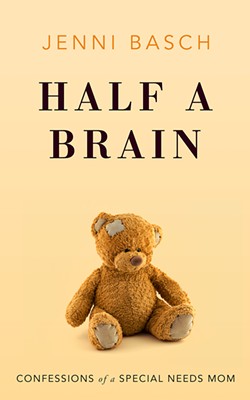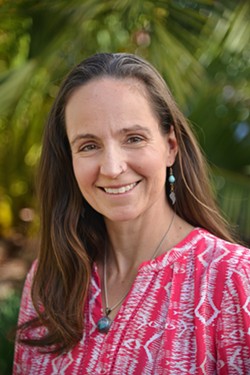Are parents of special needs children superheroes, saints, or both? Imagine the emotional roller coaster of learning your in-utero child would suffer from severe disabilities, then learning after the birth that her situation is even more dire than you could have imagined? Think about the soul-crushing work of navigating the byzantine layers of health care bureaucracy. Consider the patience it would take to care for a child with chronic seizures, extensive brain damage, cerebral palsy, and a litany of other impossible-to-pronounce maladies.

- Image Courtesy Of Jenni Basch
- GOOD READ Half a Brain is a heart-wrenching memoir filled with warmth, humor, and hope about the impossible choices of raising a severely disabled child.
For Los Osos author and therapist Jenni Basch, she doesn't want you to think she's a superhero or a saint, just an imperfect parent being forced into a perfect storm of worst-case scenarios. In her new memoir, Half a Brain, her honesty is refreshing. Instead of idealizing herself, she shows the reader her shortcomings, fears, regrets, and even darkest thoughts.
"When writing this story, I wanted to present myself as someone who makes mistakes, doesn't always know what to do, and suffers emotionally," Basch said via email. "I wanted to lay bare some of my scary, dark thoughts so that other parents could relate and feel less isolated. I have received wonderful feedback from other parents. In particular, many parents say that they appreciate my honesty. They feel exhausted, scared, jealous, and angry too, but have felt ashamed to admit those feelings to others.
"I easily could have omitted those scary, dark feelings and written myself as a superhero. But I am not a superhero. I am a flawed human being who happened to give birth to a child with special needs."
She seems to be in turns both repulsed and awed by our medical system and its personnel.
"I am both in awe and disgusted by our medical system," she admitted. "I believe we have a good medical system, but we certainly have the potential to do better. I am in awe of the people involved. We have benefitted immensely from literally hundreds of caring nurses, doctors, and other specialists. For some it was just a kind word or a quiet efficiency. Others (neurosurgeons, for example) have a technical expertise and knowledge base that is incredible.
"I talk about this briefly in the book, but the amount of paperwork and repetition or failure to yield to common sense in some cases is frustrating," she continued. "Without getting into the whole health insurance debate, we were obviously fortunate to have great insurance through my husband's employer and could have very likely had a different outcome with different insurance. Everyone should have access to the great medical care that exists here."
This is a tough read—emotionally weighty, with one unspeakably sad moment after another. Will she let her son, who's not special needs, or daughter read this book when they get older?
"My son is 11 and a voracious reader," Basch explained. "He has observed the entire writing and editing process. I offered him the chance to read the book once I finished it, but he declined. He said he lived the story, so he doesn't feel a need to read the book now. He said maybe when he's older, he would find it appealing. I really appreciated his honesty, and I can absolutely see his point.

- Photo Courtesy Of Jenni Basch
- A MOTHER'S LOVE In Half a Brain, Los Osos author Jenni Basch writes about raising her special needs daughter, Skye.
"I began writing the book when my daughter was 3, but I had to put it down for years because I was in the middle of the chaos and couldn't properly reflect on my experience. Only when she turned 8 could I bear to look at the pages again. I feel like my son is still in the middle of the chaos himself, so perhaps when he is older, he could properly reflect on the experience," she said.
"It might be difficult for him to read about his mother feeling depressed, angry, and overwhelmed, but I think he would be able to tease out those feelings and understand that my book is essentially a love story," Basch continued. "Without putting limitations on my daughter's future, I cannot imagine that she will ever have the cognitive ability to read, much less read my book. But if she were ever able to process such complexities, I would certainly encourage her to do so."
Who does she imagine is her memoir's audience and what does she hope it will accomplish?
"My memoir's audience is other parents who have children with special needs as well as professionals in the special needs community," Basch said. "I wrote this book for all the parents and caregivers who live this life and don't have a voice. Many of my daughter's specialists and school professionals read this book and felt like they truly understood her for the first time. While Skye's medical history is certainly more complex than most, all children with special needs have reasons for their aversions, behaviors, and choices. Most parents who raise children with special needs have long histories of trauma, exhaustion, fear, and anxiety. I want school professionals to better understand why these parents might seem defensive, annoyed, and overprotective."
Skye tested her mom in ways she probably never imagined. Did Basch know before this started that she had that kind of strength and resolve?
"I come from a line of strong, no-nonsense women," Basch boasted. "My maternal grandmother notoriously wrote an opinion piece about her experience having a double mastectomy after a breast cancer diagnosis. She said that the day she returned home from the hospital, she cooked dinner for her five children and husband and moved along with her life. She didn't have time to complain or reflect on life's unfairness. She picked herself up and got on with it.
"I am not as cavalier as she was, but this is the ancestral stock I come from. I think most of my friends would describe me as being tough and resolute, even before my daughter was born," she said. "However, if you had asked me 10 years ago if I could handle what I have been through, I probably would have said I wouldn't emotionally survive. It's probably for the best that I didn't know what I was in for!
"I just want to continue to educate (in a lighthearted, yet serious way of course) others about the often-misunderstood world of special needs families," Basch continued. "Parents of those kiddos can learn to improve their advocacy and work together for more opportunities. Professionals (teachers, therapists, etc.) can increase their empathy. And the general public can work on understanding that 'special needs families' are both similar ('We all love our children!') and different as well ('Honestly—we really can't go camping.')." Δ
Contact New Times Senior Staff Writer Glen Starkey at [email protected].
Comments
Showing 1-1 of 1